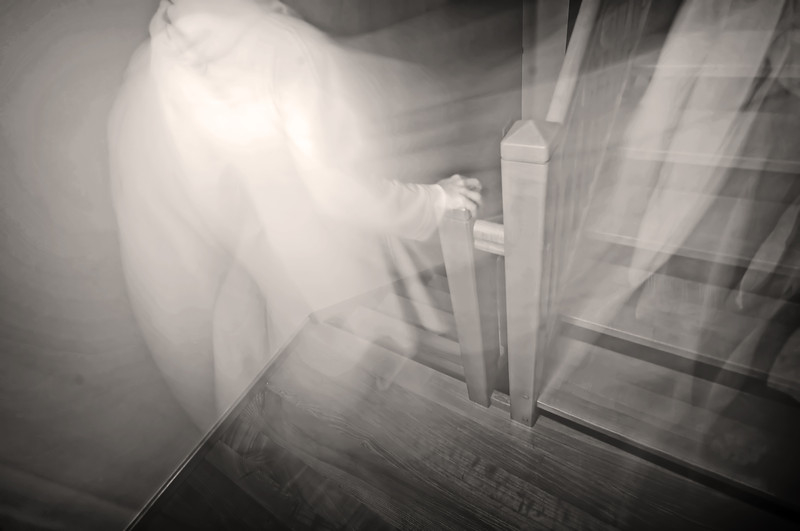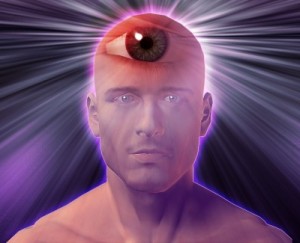Types of Hauntings
A haunting is a paranormal phenomenon of either the appearance of a spirit or supernatural being or the replay of an action or event that took place at a specific location in the past. Four common types of hauntings are given below. As yet, there are no scientific explanations for hauntings; however, parapsychologists continue to look for answers.
Residual Haunting
A residual haunting, also known as a place memory, is the most common type of haunting. In most cases it does not involve a ghost or spirit interacting with the people who are witnessing it. This type of sighting is a remnant of a past traumatic event that happened at or near the location prior to someone?s death. For example, an apparition of a woman may be seen repeatedly looking out of an upstairs bedroom window and pacing the floor. Or noises without a visual scene may be heard, such as footsteps. This same scene or sounds are repeated over and over again in an unchanging loop and often at specific times. Residual hauntings are records of energy that have been imprinted in the area in which the event took place. They are not a direct communication with the living, in fact, they are quite benign and harmless. Some people are more sensitive to observing these hauntings and typically they occur in older buildings, homes and battlefields. It is possible to do some historical research of a location to determine the event that might have caused the haunting.
????? ?
Intelligent Haunting
An intelligent haunting is also known as a traditional or classic haunting. It is called an intelligent haunting due to the fact that the spirit is aware of and able to interact and communicate with those living in the physical world. These spirits want to get the attention of the living and they can move or hide objects, send signals or even speak to do so. The optimal time for ghostly appearances is during the late night hours, but the spirits who can muster up enough energy can make their presence known in the daytime. There can be many reasons why an intelligent haunting occurs. In many cases, some entities choose to stick around their loved ones, for example, grandparents around younger children. Some are unaware that they have died because it may have happened suddenly. In those instances, the assistance of a psychic medium may be necessary to help them cross over to the other side. Other times, the spirit may not be visible ? a cold spot, experiencing chills and goosebumps or feeling as if someone is staring at you are signs. Sometimes the spirit refuses to cross over until a major issue or unfinished business is resolved in family, business or financial matters. Most of these ghosts are not malicious ? they just want to be noticed and have their message heard.
??
Poltergeist Haunting
The word poltergeist means ?noisy ghost? and the term comes from the German words ?poltern,? which means to make noise and ?geist,? which means ghost. Poltergeist hauntings usually take the form of objects moved, hidden or thrown, disturbing noises, interference with electronic devices, physical attacks and even spontaneous combustion. Objects have also been known to disappear and reappear. Ghosts can be the culprits for these disturbances but some incidents are believed to be the result of psychokinesis (PK), the power to move objects with the mind, consciously or unconsciously. If PK is the cause of the haunting, the individual is most likely moving the objects ? unknowingly and unconsciously, due to a compounding of some overwhelming stress or emotional angst the person is suffering in life. Poltergeist hauntings have been associated with young adolescent girls; however, they are not limited to that group. The haunting usually affects a person, female or male, who is possibly under great duress. However, it takes its toll on the whole household or group. Poltergeist hauntings can be sometimes playful or sometimes malicious.? When the intent is malicious, objects might be placed in such a way that could cause harm. The hauntings usually start out slowly and increase in intensity until it reaches its peak. This is when the occurrences can be the most dangerous. However, sometimes the disturbances stop abruptly and are never repeated again. ?
Demonic Haunting
In demonic hauntings, the main goal of the demon is to break down a person?s free will so that it can take over and possess the individual. The deceptive evil spirit enters a home or location to do harm and destroy all that is good and sacred. The demon not only can possess people, it can attach itself to objects. At first, these types of hauntings or possessions may seem benign or non-threatening. They can appear similar to poltergeist hauntings as they usually start out with slight disturbances, such as knocking noises, furniture being moved, etc. The demon may appear as a dark shadow in a location or may first show itself as a benevolent spirit. When the demon finally reveals itself, foul odors, extreme temperature changes and even physical attack can occur. Demons also have the ability to transform and shape shift from human to animal. The demon will try to convince the individual that it is no longer present; however, it lays in wait to strike at a time when the individual is weak or vulnerable. The demon becomes stronger when it senses fear and that is the time when a possession can take place. ?Another sign of possession is that the possessed individual becomes fluent in many languages, speaks in tongues or has gained knowledge in subjects you knew nothing about prior. The individual possessed will become a shell of his former self and become terribly cruel to those he loves. This type of haunting is not easily resolved ? it requires an exorcism. Seek guidance and help from highly trained paranormal investigators, clergymen and others familiar with demonic hauntings. ?
In conclusion, due to the popularization of ghosts, hauntings and investigations by the media today, this topic has generated a lot of ?buzz.? There are always going to be believers and non-believers. Paranormal phenomena co-exist with the physical world, and with the added media attention, hopefully more concrete explanations will be revealed and documented.
?
Read More »
What is ESP?
Extrasensory perception (ESP), also known as cryptesthesia and the sixth sense, is the ability to acquire information without the use of the five physical senses. Many people believe that everyone is born with one form or another of ESP. For some people it is more developed than others. Often, by the age of four or five years old, logic and reason start to take a stronger hold on the mind and these abilities are weakened or lost. However, there are those who do continue to develop their ESP, especially those individuals who are born into a family where psychic abilities are multi-generational and/or nurtured and encouraged.
?
The following are the abilities that fall under the umbrella of ESP.
Clairvoyance ? Ability to see events from the past, present or future without the use of the regular five senses.
Clairaudience ? Ability to hear sounds from the spirit world.
Clairsentience ? Ability to feel or sense auras, vibrations and the presence from those that have passed on.
Claircognizance ? Ability to psychically know something without pre-knowledge or being told.
Precognition ? Knowledge of an event before it occurs.
Retrocognition ? Ability to know events that have taken place in the past without previous knowledge.
Telepathy ? Ability to transfer and receive thoughts and feelings from one mind to another without verbal conversation.
Psychometry ? Ability to pick up impressions, visions, thoughts, or events relating to someone by holding an object belonging to that person.
Psychokinesis ? Ability to physically move objects with one?s mind.
Psychic Mediumship ? Ability to communicate with humans and animals who have passed on to the spirit world.
Premonition ? A forewarning that something is going to happen.
D?j? vu ? The feeling of being in an exact situation or place before.
Intuition ? Ability to know something without the use of logic or conscious reasoning. Knowledge gained by feeling, not fact.
?
In the field of parapsychology, these paranormal events are referred to as psi experiences. There are two major fields of study: 1. psi-gamma, which refers to the ability to acquire information through nonsensory or nonphysical methods, for example telepathy, clairvoyance and precognition; and 2. psi-kappa, which refers to the ability to affect something or move physical objects through nonphysical methods, for example, psychometry, telekinesis or psychic healers. Its purpose is to understand the processes or causation of these events. The studies of psi phenomena are done under well-controlled conditions, in order to remove doubt and provide valid conclusions.
?
In the 1930s, Joseph Rhine and his wife began research into these events. Rhine and his colleague, Carl Zener, developed Zener cards, a 25-card deck containing five groups each of five like symbols, to be used to test the telepathic ability of an individual. Each card contains an image of either a circle, cross, square, star or wavy line. The 25 cards are shuffled and kept out of sight from the individual being tested. The subject is then asked to give the identity of the card. A scoring system of how many correct card matches made by the subject determines his/her level of telepathy. For example, a score of 10 correct out of 25 indicates some form of telepathy. A score over 10 correct shows a more significant level of abilities. The test should be taken several times to rule out that the answers were just by chance.
![]()
?
The use of Zener cards in ESP testing has been significant in measuring its accuracy. Also, changes in brain activity have been recorded during the testing of psychics who are exercising their abilities. All of this research will prove invaluable, given the increased amount of people who either claim to possess psychic abilities or who have experienced many of these phenomena first-hand.
To take a psychic abilities test, visit the Oracle Room.
?
Read More »
Precognition: Has it ever happened to you?
 Precognition is the ability to actually perceive or see a future event through extrasensory perception (ESP) or clairvoyance, before it happens.? The term is derived from the Latin pr?, meaning ?prior to? and cognitio, meaning ?to learn.? Precognition is often confused with the terms premonition or prophecy, which only relate to a feeling of or sensing that something will happen in the future.
Precognition is the ability to actually perceive or see a future event through extrasensory perception (ESP) or clairvoyance, before it happens.? The term is derived from the Latin pr?, meaning ?prior to? and cognitio, meaning ?to learn.? Precognition is often confused with the terms premonition or prophecy, which only relate to a feeling of or sensing that something will happen in the future.
Precognitive events usually appear to individuals as a flash or spontaneous vision ? when, in an awakened state, a person receives a short intense mental scenario. One example of this would be that of a mother who is driving in her car and sees a vision of her child injured at a playground. She quickly turns the car around to find her child about to fall from a tall tree. Another example would be of a person who is about to board an airplane and has a vision of a crash that is so intense that he decides not to board the plane. He finds out later that there was in fact a plane crash.
Some people experience precognition through dreaming. A future incident is vividly played out in the dream, thus allowing the ability to predict something will happen or to avoid an upcoming situation altogether.
In studying precognition, it has been found that most of the predicted events happen within a short time frame. In 80 to 85 percent of the time, the events involve a loved one, family member or close friend. The rest of the events fall under the category of individuals who are unrelated, i.e., strangers or public figures.
Joseph Banks Rhine and Louisa Rhine performed extensive studies of precognition in the Parapsychology Laboratory at Duke University in the 1930s. The psi phenomenon of precognition is still being investigated today by parapsychologists.
To read more about parapsychology, click here.
Read More »

